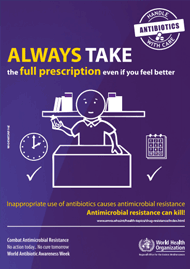 Awareness is key to reducing antibiotic resistance
Awareness is key to reducing antibiotic resistance
10 November 2016 – The second World Antibiotic Awareness Week will take place from 14 to 20 November 2016, with "Antibiotics: handle with care" as the slogan of this year’s campaign.
The World Health Organization (WHO) is warning that humanity is heading for a post-antibiotic era, in which common infections and minor injuries can once again kill due to the fact that antibiotics are becoming less effective in killing bacterial infections – a health issue known as antibiotic resistance.
Development of antibiotic resistance is accelerated in response to the overuse, low use or misuse of antibiotics in human or animal populations. These changed bacteria may infect humans and animals, and the infections they cause are harder to treat than those caused by non-resistant bacteria.
Antibiotic resistance is rising to dangerously high levels in all parts of the world, including the Eastern Mediterranean Region. New resistance mechanisms are emerging and spreading globally, threatening our ability to treat common infectious diseases.
A growing list of infections – such as pneumonia, tuberculosis, blood infections and gonorrhoea – are becoming harder to treat and interventions such as organ transplantations, chemotherapy and surgeries, such as caesarean sections, become more dangerous as antibiotics become less effective.
“Antibiotic resistance leads to higher medical costs, prolonged hospital stays, and increased mortality. It is putting the achievements of modern medicine at risk. We must act now at all levels. The required action is a shared responsibility of policy-makers, health professionals, the health care industry, agricultural sector and the public at large to work together to reduce antimicrobial resistance,” said Dr Ala Alwan, WHO Regional Director for the Eastern Mediterranean.
The emergence and spread of resistance is made worse where antibiotics are used for human or animal use without a prescription. Similarly, in countries without standard treatment guidelines, antibiotics are often over-prescribed by health workers and veterinarians and over-used by the public. Misuse of antibiotics in animal husbandry as growth promoters is equally a major factor in complicating the situation. To reduce the emergence and spread of the resistant bacteria, rationalizing the use of antimicrobials in human health and agriculture sector is crucial.
The global awareness campaign calls on individuals, governments, the agriculture and animal husbandry sectors and health professionals to take urgent action to curb and prevent antibiotic resistance.
WHO Regional Office for the Eastern Mediterranean focuses this year on raising the awareness of the general public and calls on individuals to only use antibiotics when prescribed by a certified health professional and prevent infections by regularly washing hands, preparing food hygienically, avoiding close contact with sick people, and keeping vaccinations up to date.
Related links
For more information:
Dr Ali Mafi
AMR Manager
mobile: +201099756851
Mona Yassin
Communications Officer
mobile: +201006019284








